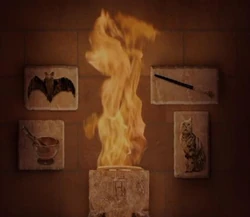
At least some content in this article is derived from information featured in: Harry Potter: Hogwarts Mystery & Harry Potter: Puzzles & Spells & Harry Potter: Magic Awakened & Hogwarts Legacy.
As such, spoilers will be present within the article.
"And then, once you had managed to find them, there were the classes themselves. There was a lot more to magic, as Harry quickly found out, than waving your wand and saying a few funny words." — The challenging nature of academic classes at Hogwarts [src]
There were a variety of subjects taught at Hogwarts School of Witchcraft and Wizardry. [1] [2] These included both the core curriculum and the electives, available from third year forward. [1]
At the end of their fifth year, students took the Ordinary Wizarding Level (O.W.L.) exams to determine whether or not they would reasonably be able to keep up with the much more advanced curriculum in the remaining two years. [3] At the end of seventh year, students would take the Nastily Exhausting Wizarding Test (N.E.W.T.), the results of which were what potential employers would look at when they were looking for a career after completing their education.
Some classes, including the core classes, might be dropped in sixth year, even if a student passed the O.W.L., thus allowing students to focus on only the classes they would need for their chosen career. Specialised classes such as Alchemy became available in sixth year provided there was sufficient demand. [1]
Starting from their First year, all students at Hogwarts were required to take seven core subjects: Transfiguration, Charms, Potions, History of Magic, Defence Against the Dark Arts, Astronomy and Herbology. [2] First-years at Hogwarts also had to take a class on flying on broomsticks. [4] Flying class was compulsory for first-years, but optional for second-years and above.
Every year, before the start of term, the school sent a shopping list to each student, telling them what books and equipment they would need to purchase for their coursework.
Upon reaching third year, students took elective classes in addition to their core curriculum. At the end of their second year at Hogwarts, students were required to choose a minimum of two additional subjects from the following list: Arithmancy, Muggle Studies, Divination, Study of Ancient Runes and Care of Magical Creatures. [5] [1] Students did have the option of taking all of these elective classes if they wished. However, this would have left them with a hectic homework schedule, and overlapping classes that would have required them to make use of a Time-Turner, which allowed them to go back in time to attend a second class simultaneously.
Students couldn't apply for Time-Turners themselves, but a student's head of house could send letters of recommendation to the Ministry of Magic, with assurances that the student in question was a trustworthy individual who wouldn't manipulate time for anything other than their academic pursuits. The student was also prohibited from telling anyone about the Time-Turner. [6]
If an elective class became a burden, or if a student found they had no talent for it, then they did have the option of dropping the course. The only known instance of this was when Hermione Granger decided to drop Divination and Muggle Studies. She still had other electives and therefore met the minimum requirement of taking at least two, so it's unknown what would happen if someone with only two electives decided to drop a class. [7] While elective classes could be dropped at this time, the core subjects could not.

At the end of their fifth year, students took an exam known as the Ordinary Wizarding Level, or O.W.L., a test to determine if a student had mastered magic to the standard level that any competent wizard should have been able to achieve. The O.W.L.s also determined whether or not a student would be allowed to continue their education, and in which subjects. If a student failed a subjects O.W.L., then they likely wouldn't be able to keep up with the more advanced material in sixth and seventh years anyway. Since the O.W.L. was such a key factor in determining a student's future prospects, preparation typically began as early as fourth year. [8]
Some time during fifth year, prior to the O.W.L., students had an appointment with their Head of House to discuss the career path they wanted to pursue. The professor would recommend the subjects they needed to get a high enough score on their O.W.L. in order to take those classes at the more advanced level and learn the magical skills that would be required for their job of choice. Taking into account their predicted O.W.L. grades based on their past performance in class, the professor might have also recommend subjects based on the student's current grades if the student was unsure of what job they would like, or recommend they find an entirely different career to pursue if they felt the student was unlikely to pass the necessary O.W.L.s required of their chosen career. [9]

At the end of the seventh and final year of their magical education at Hogwarts, students would take an exam known as the Nastily Exhausting Wizarding Test, or N.E.W.T., on all the subjects they had continued to take at the more advanced level after passing their O.W.L.s, to determine if they had mastered magic at the advanced level that not everyone was able to achieve. The results of which were what potential employers would look at when the student was looking for a career after graduation. Every student could choose whether or not they wanted to take their N.E.W.T.s, and not everyone would pass. There were many employers who accepted applicants who only had O.W.L. grades, but it helped to have N.E.W.T.s, and many high profile jobs preferred them. [9] Some careers, such as Auror or Healer, required a student to earn top grades in as many as five N.E.W.T.s.
Course work during sixth and seventh years was much more advanced than it had been previously, colloquially referred to as N.E.W.T.-level. Hermione Granger for example was particularly talented in Potions, but even she struggled with the subject at the N.E.W.T.-level. The majority of students' time was spent studying and trying to cope with the vast amounts of homework they were being given. [10]
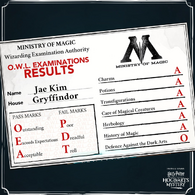
The individual professor would decide the O.W.L. grade needed to take their class at the N.E.W.T.-level; most were happy to accept students who had earned 'Exceeds Expectations', while others insisted on only accepting students who had earned an 'Outstanding' in their subjects O.W.L. exam. Even if a student passed a subject's O.W.L., they could still choose to discontinue taking the subject, even if it was a core class, thus allowing them to focus all their attention only on the subjects they were going to need for their chosen career.
Students in the sixth year could elect to take part in Apparition lessons for a fee of twelve Galleons. [11] Very specialised subjects such as Alchemy were also offered in the final two years, but would only be provided if there was sufficient demand. [1] It is unknown whether the student would need any grades from another subject to take the subjects, or whether it was open to anyone to try. There may have been a N.E.W.T. exam for these subjects too.
Certain subjects could be abolished for certain reasons. Albus Dumbledore was originally planning to scrap Divination altogether due to its inaccuracy to most, but he kept the subject as a pretence to protect Sybill Trelawney from the Death Eaters after she made the prophecy about the coming of a hero who would defeat Lord Voldemort. [12]
During the conquered Ministry's regime, Defence Against the Dark Arts was cancelled and replaced with outright Dark Arts, conforming with Lord Voldemort's reign. [13] Following the final defeat of Voldemort, the Dark Arts class was abolished and the regular Defence class was restored.
Hogwarts had long since banned any study on the subject of Horcruxes, due to their extreme dark nature, but certain books regarding said topic remained available to students in the Restricted Section of the library, before Headmaster Dumbledore removed them. Any remaining books that mentioned Horcruxes did not go into detail and only said that they they were too terrible to talk about. [14]
The study on the Elixir of Life was another subject banned in Hogwarts, as the staff were fearful that a student's search for the Elixir might eventually consume them. [15] Despite this, details about the stone were available in the Alchemy section of the Hogwarts Library. [16]

Astronomy involved observation of the night skies with telescopes, as well as gaining an understanding of the various phenomena that go on in space, such as Lunar phases and Space weather. Known assignments included learning the names of stars, constellations and planets, as well as charting their locations, movements, and environments. [2] It is currently unclear exactly how this subject is relevant to the education of witches and wizards, but according to Satyavati Shah, there is much that can be gleaned from the stars. [17] It was the only field of study at Hogwarts that had a direct equivalent in the Muggle world.
Astronomy classes took place in the highest level of the Astronomy Tower, the tallest tower in Hogwarts. [2] Required equipment included a telescope. Professors known to have taught this subject include:

Charms comprised of a very wide range of different spells concerned with giving a target (be it an object or an individual) new and unexpected properties and/or making the target perform certain actions, among other possible effects. Charms could be some of the most powerful and game-changing spells in existence. Successfully casting a charm required concentration, precise wand movements, and proper pronunciation of the spells incantation. Charms classes were described as notoriously noisy and chaotic, as the lessons were largely practical. [18] Charms was considered a "soft option" by some when picking N.E.W.T.-level classes. [19]
Charms classes took place in Classroom 2E along the Charms corridor on the third floor, near the Third-floor corridor. Required equipment included a wand and required textbooks included The Standard Book of Spells series and Quintessence: A Quest. Professors known to have taught this subject include:

Defence Against the Dark Arts, commonly shortened to D.A.D.A., was the class that taught students how to protect themselves against the Dark Arts, [21] [2] how to use offencive and protective spells, and how to properly handle and deal with dark creatures. [22]
This subject required students to participate in practical lessons in order to truly learn the subject; [22] [19] if taught only theory based lessons out of books, then it would only hinder them. [23]
The subject had an extraordinarily high turnover of staff members — throughout Harry Potter's time at Hogwarts, no Defence Against the Dark Arts teacher remained at Hogwarts for more than one school year. Dumbledore suggested that Voldemort jinxed the position because his application for it was rejected. [24] After the end of the Second Wizarding War, the jinx on the position was lifted with Voldemort's death.
After he graduated, Harry Potter would occasionally come to the class to give lectures on the subject. [35]

Herbology was the study of magical plants and fungi. Students learned how to properly care for and utilise different plants, as well as about their magical properties and what they were used for. [2] Students were also taught a few spells that were helpful for gardening, such as the Herbivicus Charm. [36] [37]
The further a student progressed through their education, the more difficult and dangerous the plants became. [10] As such, students were allowed to use profane language loudly if any of the dangerous plants snuck up on them, as a way to warn others, as well as cope with the stress. [10]
Herbology classes took place in various greenhouses located behind the castle. Required equipment included a wand, a pair of Dragon-hide gloves, Dragon dung fertiliser, earmuffs, and a Watering can, and required textbooks included One Thousand Magical Herbs and Fungi, Winogrand's Wondrous Water Plants, and Flesh-Eating Trees of the World. Professors known to have taught this subject include:

History of Magic was the study of the history of the wizarding world. The lessons in this class were only lectures about significant names, dates and events in wizarding history. [2] [40] Topics had included the Goblin Rebellions, [41] the Witch-hunts, [42] [43] the Giant wars [23] [44] and the origin of the International Statute of Wizarding Secrecy. [45] The class was considered very boring due to Binns' droning voice. [2] [23]
History classes took place in Classroom 4F on the first-floor. Required textbooks included A History of Magic. Professors known to have taught this subject include:
This was the only class at Hogwarts that was taught by a ghost, as the professor never noticed he had died and simply continued teaching as if nothing had changed. [2] [40]

Potions was the exact art and subtle science of creating various liquid mixtures with different magical effects, many of which could not be achieved through spells. [47] It required adding the correct ingredients into the cauldron and stirring the brew in the correct way, both of which had to be done at the right times and at the right temperatures. [2] Students also studied the different ingredients used in potion making and their properties. [17] Potions was considered a difficult class to achieve an O.W.L. in, as only twelve students from Harry Potter's year managed it. [19] The O.W.L written exam was described as "difficult". [3]
Potions classes took place in Hogwarts Dungeons. Required equipment included a wand, a Cauldron, a set of Brass scales, a set of Phials (glass or crystal), and required textbooks included Magical Drafts and Potions, One Thousand Magical Herbs and Fungi, Advanced Potion-Making, and A Collection of Above Three Hundred Receipts in Cookery, Physick, and Surgery. Professors known to have taught this subject include:
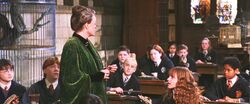
Transfiguration was a very difficult theory-based subject that practised the art of changing the form or appearance of an object, as well as changing it back. It was also possible to change inanimate objects into living creatures and vice versa, as was changing a living creature into another species. Conjuring things out of thin air, making things vanish into thin air, and making things switch places were also elements of transfiguration. Human Transfiguration was considered the most difficult branch of this subject. Transfiguration has been described as "some of the most dangerous magic you will be taught at Hogwarts". [2]
Transfiguration classes took place in Classroom 1B on the ground-floor, around the Middle Courtyard. Required equipment included a wand and required textbooks included A Beginner's Guide to Transfiguration, Intermediate Transfiguration, and A Guide to Advanced Transfiguration. Professors known to have taught this subject include:
Arithmancy was a branch of magic concerned with the magical properties of numbers. It was reportedly difficult, as it required memorising or working with many charts. [48]
Arithmancy classes took place in Classroom 7A on the seventh floor. Required textbooks included Numerology and Grammatica. Professors known to have taught this subject include:

Care of Magical Creatures, also known as Creature Care, and formerly called Beasts class, was a class which instructed students about various magical beasts; about their behaviour and how to properly identify and approach them, as well as how and what to feed them, how to groom them, how to mount and ride them, and how to breed them, as well as the proper way to treat said beasts and how to act around them. [49]
Care of Magical Creatures classes took place outside the castle. [49] Required textbooks included The Monster Book of Monsters and Fantastic Beasts and Where to Find Them. Professors known to have taught this subject include:

Divination was different from other magical subjects; it required the practitioner to possess a natural aptitude. One could not simply study hard and expect to get better at it, if a witch or wizard lacked any aptitude for divination, then they were doomed to fail no matter how hard they worked. [49]
Divination was described by Professor McGonagall as "one of the most imprecise branches of magic". Supporters of the subject claimed that it was an inexact science that required innate gifts like the "Inner Eye". Those opposed claimed that the subject was irrelevant and fraudulent. [49]
Divination classes took place in a classroom accessible through a circular trapdoor in the North Tower. [49] Required textbooks included The Dream Oracle and Unfogging the Future. Professors known to have taught this subject include:
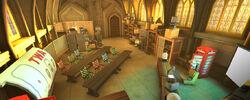
Muggle Studies was a class that taught about how Muggles lived their lives, as well as various Muggle inventions and their use of electricity. It also included Muggle Art and Muggle Music. [64] [65] However, the information came from a wizarding point of view.
Muggle Studies was considered by some to be a soft option, but others, such as Percy Weasley, thought it was important for magical people to have an understanding of the non-magical community. [5]
In the 1997–1998 school year, when Voldemort and his Death Eaters took control of the British Ministry of Magic, Muggle Studies was made into a mandatory core class and the curriculum was changed to described Muggles and Muggle-borns as subhuman and worthy of persecution. [13] After Voldemort's final defeat, Muggle Studies returned to its previous arrangement.
Muggle Studies classes took place in a classroom on the first-floor, accessed through a showroom displaying various Muggle artefacts. Required textbooks included Home Life and Social Habits of British Muggles. Professors known to have taught this subject include:
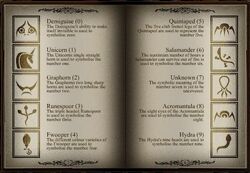
Study of Ancient Runes was a theoretical subject that involved the study and translation of ancient runic scripts. [34]
Study of Ancient Runes classes took place in a Classroom 6A on the sixth-floor. Required textbooks included Advanced Rune Translation, Ancient Runes Made Easy, Magical Hieroglyphs and Logograms, Rune Dictionary, and Spellman's Syllabary. Professors known to have taught this subject included:
Alchemy was a sort of composite subject between Transfiguration, Potions and Muggle Chemistry, the ancient science of Alchemy focused on the study of the composition, structure, and magical properties of natures four basic elements, (fire, earth, air, and water), as well as the transmutation of substances into other forms. The three greatest ambitions of Alchemy were the transmutation of base metals into gold, the discovery of a universal solvent, and the creation of a miracle cure-all remedy that would prolong one's life indefinitely, known as "panacea". A less well known branch of alchemy was Spagyric, or "plant alchemy", which produced herbal medicines using alchemical procedures. Some witches and wizards considered Alchemy to be some of the most difficult magic known to wizardkind.
The subject was only offered to N.E.W.T. level students, and the class was only held if enough students wanted to study it. [1]
Alchemy classes took place in a classroom in the Dungeons.

Apparition was the magical form of teleportation in the wizarding world that allowed a person to instantly travel from one location to another, though using this ability was notably unpleasant. The class was a twelve-week course starting after the Christmas holidays. Lessons were optional, but only available to students who were seventeen, or who would turn seventeen before the start of the next school year. The course cost 12 Galleons to take.
In the wizarding world, performing Apparition required a licence and could only be legally performed by people over seventeen years of age. The reason for the restriction was that Apparition was dangerous if done improperly: insufficient concentration could have led to body parts being left behind in an unfortunate side-effect known as splinching.
Although magical enchantments on the Hogwarts Castle and its grounds prevented Apparition and Disapparition there, these protections were temporarily relaxed within the Great Hall for short periods to permit students to practise Apparition. Wilkie Twycross, a Ministry of Magic Apparition Instructor, offered lessons in Apparition to sixth-years. [69]
Dark Arts taught students to use numerous forms of Dark Magic, including the Unforgivable Curses and possibly how to conjure Fiendfyre. When the school had only just been founded in the late 900s, one of the schools founders, Salazar Slytherin, had wanted to teach the Dark Arts, but the inclusion of the subject was opposed by the other founders. It was possible that he initially constructed the Chamber of Secrets as a place to teach his students Dark Magic. [70]
It only properly became a subject at Hogwarts (and a mandatory core class for all students) during the 1997–1998 school year after Lord Voldemort and his Death Eaters took over both the school and the British Ministry of Magic. It was taught by Amycus Carrow. [13] It replaced Defence Against the Dark Arts that school year.
After Lord Voldemort and his forces were defeated, the subject was discontinued and returned to being Defence Against the Dark Arts.

Flying, also known as Broom Flight Class, was the class that taught students how to fly by riding on magic flying broomsticks. Students learned both how to handle a broom and progressively worked on various techniques and manoeuvres that could be performed while in flight, as well as receiving proper instructions on the subject of proper broom care and maintenance. This subject was the only one that required physicality. [4]
Flying class was only mandatory to Hogwarts first years and optional for second years and above. Students who continued to take this class usually either had an interest in joining their House Quidditch teams or they just really enjoyed flying and may have chosen to continue with the subject to improve their skills.
Flying classes took place outside in and above the Castle Courtyard. Required equipment included a broomstick, although first-year students were not permitted to have their own broomstick, instead the school provided them. Professors known to have taught this subject include: